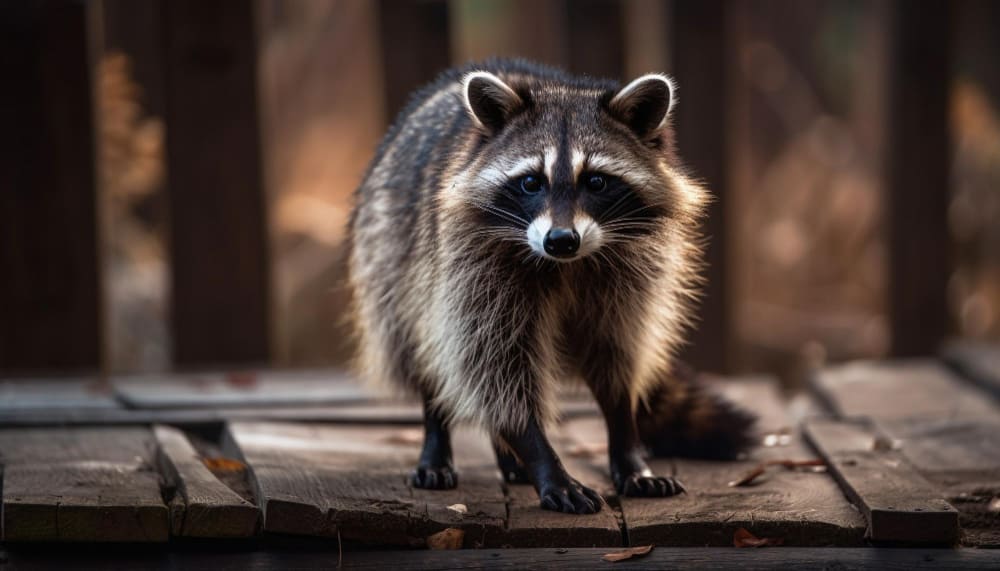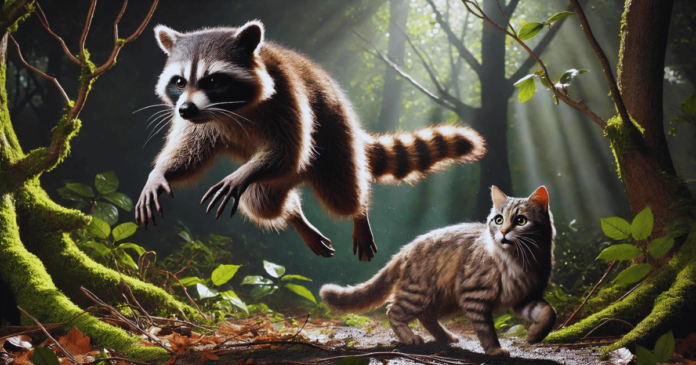Do Raccoons Eat Cats? This question often arises due to the curious and sometimes concerning interactions between raccoons and pets, especially cats. While it’s uncommon for raccoons to see cats as prey, there are instances where they may attack and harm them.
Most encounters between raccoons and cats end without serious trouble, but understanding the risks—including bites, disease transmission, and raccoons’ opportunistic feeding habits—can help you protect your pets. Staying informed is key to ensuring your home and yard remain secure from wildlife.
Table of Contents
Understanding Raccoon Behavior
Raccoons have unique behaviors that affect their interactions with other animals, including pets like cats. By exploring their dietary habits, predatory instincts, and territorial nature, you can better understand how raccoons might behave in your environment.
Dietary Habits
Raccoons are omnivorous animals, meaning they eat both plants and animals. Their diet includes fruits, nuts, insects, and small animals. They are opportunistic feeders, which means they will take advantage of whatever food sources are available.
This flexibility allows raccoons to thrive in various environments. They are known to scavenge in urban areas, often rummaging through trash cans. Their keen sense of smell helps them find food easily, which can lead them to homes where pets are present.
Be cautious if you leave food outside, as it may attract raccoons. They can consume pet food or even engage in scavenging when looking for a meal. When other foods are scarce, raccoons might turn to smaller animals, including kittens.
Predatory Instincts
Will raccoons kill cats? Not typically. Raccoons generally do not hunt adult cats. However, they might see vulnerable pets, such as kittens, as potential prey. Raccoons have strong jaws and sharp teeth, enabling them to defend themselves. When threatened, a raccoon may act aggressively to protect its territory.
Will raccoons kill kittens? Yes, in certain situations. Kittens are more vulnerable than adult cats and can be at risk if a raccoon feels threatened or is desperate for food. Supervise small animals, especially at night when raccoons are most active.
Can a cat fight a raccoon? It’s possible but challenging. While cats are agile and can defend themselves, raccoons are larger and equipped with sharp claws and teeth. In a confrontation, a domestic cat may struggle to defend itself effectively against a raccoon.
Is a raccoon afraid of a cat? Not necessarily. Raccoons are generally not afraid of cats, especially if the cat is smaller or weaker. However, most raccoons prefer to avoid confrontation and will typically flee if faced with a larger or more aggressive cat.
It’s important to supervise small animals, especially at night when raccoons are most active. Their predatory instincts may put unattended pets at risk, especially if the pet is weak or small.
Understanding this instinct helps you create a safer environment for your pets. Install sturdy fences and avoid leaving pets outside unattended to reduce any chances of interaction.
Territorial Nature
Raccoons are generally solitary animals, with each individual maintaining its territory. They can be very protective of their home area. If another raccoon enters their space, they may engage in aggressive behavior to assert dominance.
Their territorial nature can sometimes lead to conflicts with other animals, including pets. Encountering a raccoon might scare your cat. They are known to defend their territory aggressively, especially when feeling threatened.
To minimize risks, consider keeping your yard clear of food scraps and ensuring your pets are supervised during outdoor time.

Interactions Between Raccoons and Cats
Do raccoons and cats get along? Typically, yes, but it varies. In urban and suburban areas, raccoons and cats may cross paths, especially when raccoons are foraging for food. These encounters are usually brief and non-confrontational, with most cats avoiding larger animals unless provoked.
Will a raccoon hurt a feral cat? It’s possible, but not common. Feral cats may be at risk if they encounter a raccoon, particularly if they are weak or threatened. Supervision and keeping pets indoors during peak raccoon activity times can help prevent these encounters.
Do raccoons eat kittens at night? They may. Raccoons are nocturnal and are more likely to come into contact with cats and kittens during the night. If you notice a raccoon around, it’s crucial to protect your pets and ensure they are safely indoors.
Urban and Suburban Encounters
In cities and suburbs, raccoons often search for food in trash cans and gardens, which can lead them close to homes where cats live. Cats, being curious animals, may investigate any new visitors. Raccoons are generally nocturnal, while many cats are active during the day.
When they do meet, raccoons may show curiosity rather than aggression. Most interactions are brief and non-confrontational. Cats usually avoid larger animals unless provoked. Still, smaller or weaker cats might be at risk if they encounter a raccoon that feels threatened.
Will a cat fight a raccoon? Yes, a cat might fight a raccoon if they come into contact. However, cats are usually cautious and avoid confrontations with larger animals. In a direct fight, a raccoon’s size and sharp claws give it an advantage.
Will a raccoon hurt a feral cat? Raccoons may attack feral cats, especially if they feel threatened or are defending their territory. It’s essential to provide safe spaces for feral cats to reduce these risks.
Protecting Domestic Cats
To keep your cat safe from raccoons, there are steps you can take. First, secure your garbage to avoid attracting raccoons. Use tightly sealed bins and remove food waste promptly.
Creating a safe outdoor space for your cat is also important. Consider using fencing or supervised outdoor time to keep your cat safe. Keep your cat indoors at night when raccoons are more active.
If your cat often roams outside, consider giving it a collar with an identification tag. This way, if your cat does have an unexpected encounter, it can be returned safely. These simple precautions can help protect your feline friend.
Cases of Raccoons Eating Cats
Raccoons rarely eat cats, but there are instances where predation occurs. Raccoons may prey on kittens when other food sources are scarce. For example, raccoons might be seen eating alongside cats if pets are fed outdoors, which can attract raccoons to the area.
Evidence of Predation
There are documented cases of raccoons injuring or killing cats. While these events are not common, you may find reports from pet owners whose cats have gone missing or were found injured.
In some situations, raccoons have been observed attacking kittens or smaller cats. This could be due to opportunistic behavior rather than a targeted attack.
Often, clues left at the scene—such as fur, scratch marks, or other signs of a struggle—are used to identify these predatory interactions. If you notice your cat acting differently or avoiding certain areas, it may be worthwhile to investigate further.
Will a raccoon kill a cat at night? Yes, a raccoon might attack a cat at night, particularly if the cat is young or vulnerable.
Factors Contributing to Attacks
Several factors can influence whether raccoons will pose a threat to your cat:
- Food Sources: Raccoons are opportunistic feeders. If they are desperate for food, they may see small animals like kittens as an easy meal.
- Territorial Behavior: If a raccoon feels threatened or is defending its territory, it might react aggressively towards cats that it perceives as intruders.
- Age and Size of the Cat: Younger or smaller cats may be more vulnerable than adult cats. Raccoons, being larger, have an advantage over these smaller felines.
- Environment: Areas where raccoons are common and where they have access to food sources can see more incidents. Keeping your yard clean can help reduce these opportunities.
Staying alert to these factors can help you protect your pet.
Preventing Raccoon Predation
You can take several steps to keep your cats safe from raccoons. By securing outdoor spaces, providing safe shelters, and using specific deterrents, you can help reduce the risk of raccoon encounters.
Securing Outdoor Spaces
- Install a Tall Fence: A sturdy fence at least six feet high with an outward overhang can help keep raccoons out.
- Seal Trash Cans: Keep trash bins tightly sealed and stored away.
- Avoid Leaving Pet Food Outside: This can attract raccoons. Store pet food securely.
Safe Shelters for Cats
- Provide Enclosed Shelters: Use insulated outdoor shelters with small entryways to protect against larger animals.
- Elevate Shelters: Place shelters in quiet, elevated spots to keep them dry and secure.
- Create multiple shelters: if you care for feral or stray cats. This ensures they have safe options in case one shelter becomes compromised.
Deterrents
- Motion-Activated Sprinklers: These can startle and deter raccoons from entering your yard.
- Raccoon Repellents: Use safe, non-toxic repellents specifically designed to deter raccoons.
Being proactive about these deterrents can greatly reduce the chances of raccoon encounters with your pets.
Additional Considerations for Pet Owners
Monitoring Wildlife Activity
Keeping track of wildlife activity in your area can be crucial for pet safety. Regularly observe your surroundings and note any signs of raccoons or other wildlife. Look for evidence such as:
- Footprints or paw prints in the dirt or mud.
- Raccoon tracks near trash cans or pet food bowls.
- Damage to garbage bins or other outdoor areas.
Educating Yourself and Others
- Educate Yourself: Understanding raccoon behavior and the potential risks they pose can help you take effective measures. Research local wildlife regulations and guidelines to stay informed.
- Spread Awareness: Share information about raccoon safety with friends and neighbors. Community awareness can help create a safer environment for pets and reduce the likelihood of dangerous encounters.
Emergency Preparedness
Have a Plan: In case of an encounter or attack, know what steps to take. Keep contact information for local animal control or wildlife rescue agencies handy.
Seek Veterinary Care: If your pet is bitten or injured, get them checked by a veterinarian immediately. Raccoon bites can lead to infections or diseases such as rabies.
FAQs About Raccoons and Cats
Q: Can raccoons transmit diseases to cats?
A: Yes, raccoons can transmit diseases such as rabies and leptospirosis to cats through bites or scratches. Keep your pets up-to-date with vaccinations and monitor them for any signs of illness.
Q: How can I tell if a raccoon has been in my yard?
A: Look for signs such as overturned trash cans, scattered pet food, or tracks. Raccoons are notorious for rummaging through garbage and can leave a noticeable mess.
Q: Are there specific times of year when raccoons are more active?
A: Raccoons are generally more active in the spring and summer months, particularly during their breeding season. They are also nocturnal, so nighttime activity is common.
Q: What should I do if I spot a raccoon during the day?
A: Raccoons are primarily nocturnal, so seeing one during the day can indicate a problem. It might be ill or in search of food due to a lack of resources. Avoid approaching the animal and contact local wildlife control if necessary.
Conclusion
Do raccoons eat cats? Though rare, raccoons can pose a danger to cats, particularly kittens. Understanding the relationship between raccoons and cats and taking preventative measures can help you protect your pets. Keep food sources secure, supervise your pets, and create safe outdoor spaces to minimize risks.
Understanding the dynamics between raccoons and cats is essential for any pet owner concerned about their furry friend’s safety. While raccoons are unlikely to hunt adult cats, their opportunistic nature and potential for aggression mean it’s important to take precautions.
By securing your home, supervising your pets, and remaining vigilant about wildlife activity, you can greatly reduce the risk of negative interactions. Implementing preventative measures and staying informed will help ensure that both your pets and local wildlife can coexist safely.
In summary, maintaining a secure environment and practicing awareness are key steps in protecting your pets from raccoons and other wildlife. Stay proactive and informed to keep your furry companions safe and healthy.


